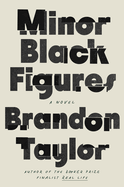
The question of whether an artist should tell another person's story animates Minor Black Figures by Brandon Taylor (Real Life), a literary provocation that probes notions of grace, morality, free will, and the role of artists in the debate over society's most pressing issues. Wyeth is a gay, Black artist who shares a Manhattan studio with several other creatives. He has made a series of paintings inspired by films from European cinema, most notably Ingmar Bergman's Winter Light and the works of French New Wave director Éric Rohmer. Wyeth replicated stills from Rohmer's work, but with Black people instead of white characters. When he sold one such painting, "people thought [he] was talking about Floyd and Kaepernick," a misunderstanding that led to disappointment in his future work.
Anyone who makes art will feel the tug of Wyeth's dilemma, rendered in heartfelt scenes infused with philosophical brooding, as he searches for a new subject. He's soldiering through a job at a gallery and another one with an Upper West Side restorer, and he seethes over a collective called MangoWave, artists who "were geniuses at turning the game of social capital into paintings. They were simply doing it with brown people and calling it radical." When Wyeth begins a relationship with Keating, a white man "on a break" from his time as a Jesuit priest, Wyeth thinks he may have found that elusive theme. Nothing is that simple, however, as readers discover in this fine novel, a complex work unafraid to raise profound moral questions. --Michael Magras, freelance book reviewer

